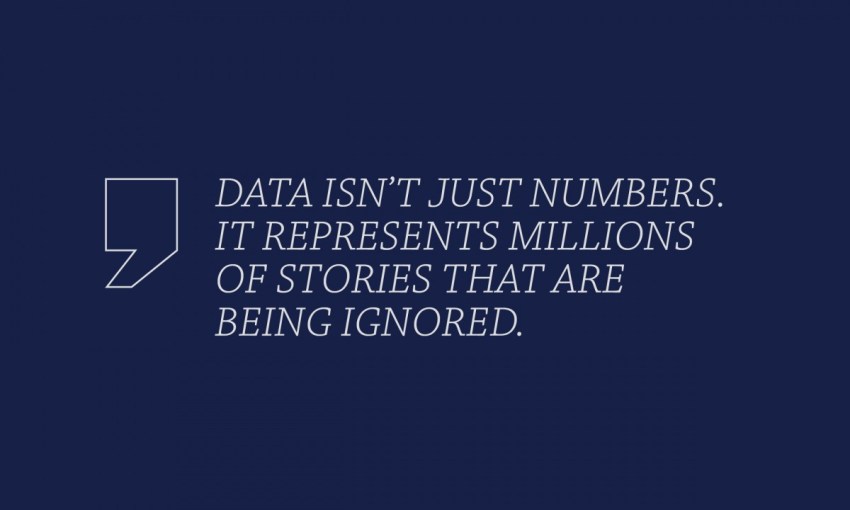This article includes some of Farrin's bad teenage poetry. Please enjoy.
We can save democracy with data
Like almost everyone, I wrote some bad teenage poetry.
I submitted one poem as part of an English assignment in Year 10. My teacher was nice enough to give it a good grade, but also made a concerned call to my Mum.
We have more stats on the performance of our footy players than on the performance of our politicians. You can change that, and help bring to light the stories that aren’t being told by contributing to The Democracy Project on Kickstarter.
None of the rewards are a bad teenage poem by Farrin, but if the money’s right, we’ll certainly consider it.
And – if you’re not in a position to contribute financially, but believe in the project – you can help instead by spreading the word and sharing the Kickstarter page with everyone you know.
I think the problem lay in my choice of “lines” as a metaphor for life, and the closing (terrible, highly embarrassing – please enjoy!) stanza –
Because every line is
Straight
Narrow
And short
I guess it wasn’t a very cheerful outlook on life. But while I don’t stand by the bad (Truly awful!) writing, I do stand by the sentiment even 12 years later.
Life is basically meaningless.
When there’s 7.6 billion other lives happening around you, it’s pretty good evidence that your presence is unimportant. Sure, a few people would be very upset if I disappeared. But largely, things would carry on exactly as they were before.
I fully respect that other people find meaning in their life in other ways. But, because I, like my 15-year-old self, think that my life is pointless, I get to create purpose for myself.
For me, among a vague idea that I should have a nice time and make sure the people I love are having a nice time, I also feel that I should be telling the stories that aren’t getting told.

Farrin is founding editor of CityMag and City Standard.
I hope I can bring attention to the concerns, ideas, and opinions of people to whom we don’t normally listen. That’s not always what we do at CityMag, but I think it’s the most important stuff we do.
It’s also part of the reason we’ve launched a campaign to crowdfund The Democracy Project, which brings data into the democratic process.
Data isn’t just numbers. It’s representative of millions of stories that are being ignored.
When I was working in Parliament House briefly, I was introduced to the Unmet Need list, which details how many people with disabilities are not being provided essential services.
In this data I found a deep well of ignored stories. For example, in June 2017 alone, 495 people classified as Category One (at risk of “homelessness / immediate and high risk of harm to self or others”) were without supported accommodation.
That is 495 people in South Australia who needed help, and weren’t getting it. That is 495 individual stories of living in dangerous situations. 495 people who the Government knew were at extreme risk, but who weren’t being offered a hand.
The stories of these individuals are important. And yet the number representing them may well be the only way their story ever gets told. The Unmet Need list taught me that if we think of data as the start of a story, not the entirety of a story, it can be a hugely powerful tool for changing who we listen to.
The Democracy Project is built around this idea.
The stories we’re told about political issues are always told by the same few voices. Politicians and their myriad advisors tightly control the messages that filter out into the public – about bad news and good. And then the media swoops in and picks up the story, re-crafting it to incite the most engagement (read: clicks) from their readership.
The stories might be about different issues, but the way they’re told is the same – statement from Minister, statement from Shadow Minister rebutting some part of what the Minister said, maybe throw in a quote from someone advocating on behalf of those affected by the issue (if there’s room). Repeat.
Data can break this cycle. It’s a way to find the rhetoric-free reality behind any issue.
But finding data can be very hard. A lot of it exists, and a lot of it is public, but it’s a full-time, specialist job working out where it lives, deciphering it, then translating it into something that’s user-friendly. Once, I spent three full days (and nights) trying to figure out if the amount of federal funding per university student had increased or decreased over the past twenty years. I still do not know.
The Democracy Project is a simple idea that makes it easy to see the stories data is telling.
It’s true! The Unmet Need list isn’t included in the issues The Democracy Project will focus upon. That’s because that data is already collected and easily accessible. For more information on how we decided what issues the Project should focus on, read the FAQs on the Kickstarter page.
If it gets funded, it will focus on six key South Australian issues –
- Electricity prices and mix of energy sources
- South Australia’s brain drain
- Urban sprawl
- Support for the arts
- Housing affordability
- Employment across industries
Every quarter, we’ll gather data on those issues then publish it as easy-to-understand, interactive tools (the tools will be things like this, or this, or even this). We’ll update these tools with new data every three months for the whole four years of the Government.
https://vimeo.com/272351190
It will become a comprehensive, evolving resource – data journalism that puts a bunch of useful information all in one place, and we’ll all be able to watch as things get better or worse, and understand why that’s happening.
Importantly, we’ll use the data as a starting point to tell the stories of those issues. We’ll follow what the data tells us – good or bad – and then write stories about why those things are happening and who they are happening to.
We’ll know if politicians are keeping their promises. We’ll know why they are or they aren’t. We’ll know if the snipes from the Opposition are based on convenient truths or reliable ones. We’ll know who is missing out, and who is getting it good.
We’ll find the voices that are being ignored and we’ll pay attention to them. And we’ll ask different questions of the people who are used to controlling the message.
The Democracy Project, through data, is a new way of telling the story of our state.
It is about re-asserting our right to a functioning democracy. It’s about breaking the networks of power and privilege that elevate some voices and some stories while silencing others.
It’s about stats, not statements. But mostly, it’s about the people who those statistics represent.




